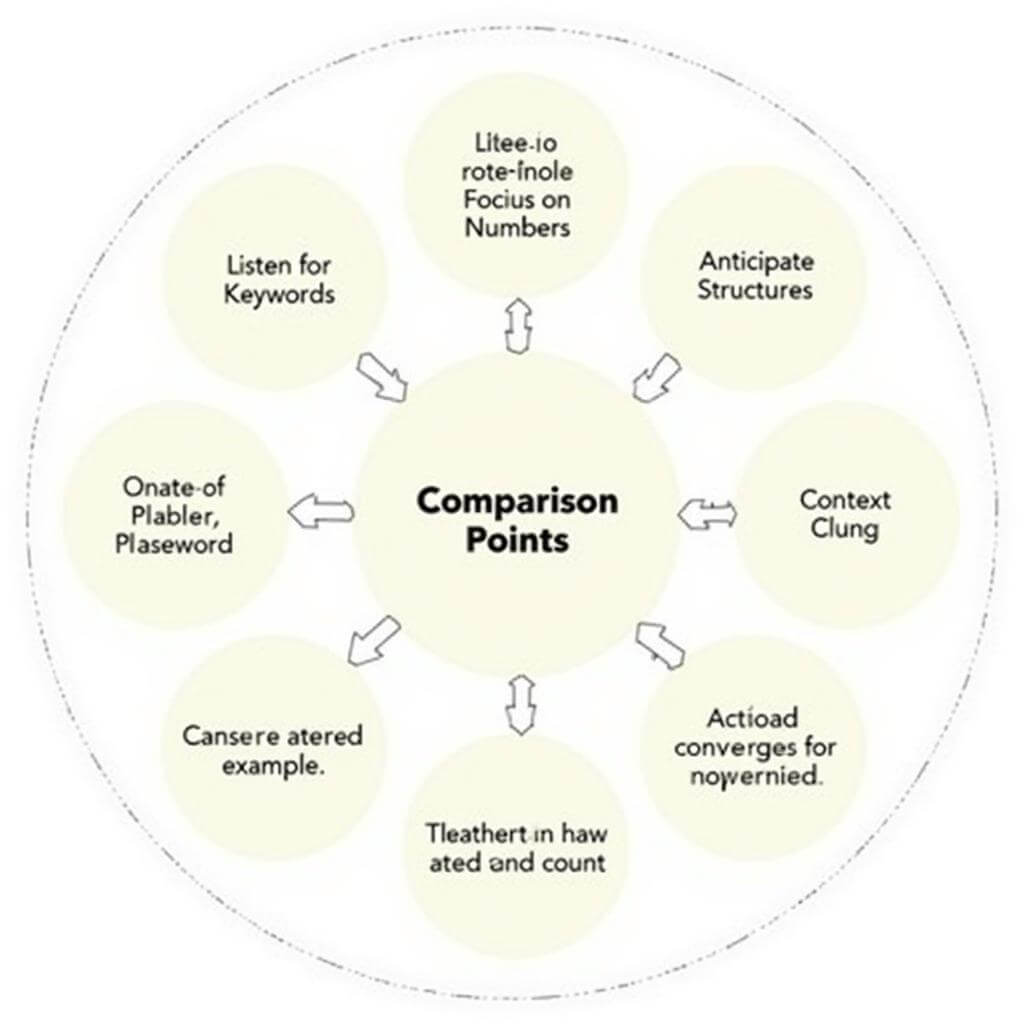IELTS Listening can be challenging, especially when it comes to identifying comparison points. This crucial skill is essential for achieving a high score in the listening section. In this article, we’ll explore effective strategies for listening for comparison points in IELTS, providing you with valuable insights to excel in your exam.
Understanding Comparison Points in IELTS Listening
Comparison points are elements that speakers use to contrast or compare different ideas, objects, or situations. In IELTS Listening, these points are often used to test your ability to understand and differentiate between similar pieces of information.
Types of Comparison Points
- Direct comparisons: Using words like “more than,” “less than,” or “compared to”
- Implicit comparisons: Contrasting ideas without using direct comparison words
- Numerical comparisons: Comparing quantities, percentages, or statistics
- Qualitative comparisons: Comparing qualities or characteristics
- Time-based comparisons: Contrasting past, present, and future situations
Practicing with academic listening can help you become more familiar with these types of comparisons and improve your overall performance.
Key Strategies for Identifying Comparison Points
1. Listen for Comparison Keywords
Pay close attention to words and phrases that signal comparisons:
- More/less than
- Compared to/with
- In contrast to
- On the other hand
- While/whereas
- Similarly/likewise
- However/but
2. Focus on Numbers and Quantities
Numerical comparisons are common in IELTS Listening. Be prepared to hear and understand:
- Percentages
- Fractions
- Decimal points
- Large numbers
- Units of measurement
Focusing on key details like these can significantly improve your ability to identify comparison points accurately.
3. Anticipate Comparative Structures
Familiarize yourself with common comparative structures:
- As…as
- The same as
- Different from
- Similar to
- Prefer…to
- Would rather…than

4. Use Context Clues
Sometimes, comparisons are not explicitly stated. Pay attention to:
- Tone of voice
- Emphasis on certain words
- Pauses or hesitations
- Overall context of the conversation
5. Practice Active Listening
Engage with the audio actively:
- Predict possible comparisons based on the topic
- Visualize the information being presented
- Listen for repeated ideas that might indicate important comparison points
Common Pitfalls to Avoid
- Misinterpreting similar-sounding numbers
- Focusing too much on individual words and missing the overall comparison
- Failing to recognize implicit comparisons
- Getting distracted by irrelevant details
- Not keeping up with the pace of the audio
Practical Exercises for Improvement
-
Compare and contrast exercises: Listen to descriptions of two items and identify the differences and similarities.
-
Number dictation: Practice writing down numbers quickly and accurately as you hear them.
-
Keyword spotting: Listen to a passage and write down all the comparison keywords you hear.
-
Gap-fill exercises: Fill in missing comparison words in a transcript while listening to the audio.
-
Paraphrasing practice: Listen to a comparison and try to restate it in your own words.
Managing long conversations in listening can be particularly challenging when identifying comparison points. These exercises can help you build the stamina and skills needed for longer listening tasks.
Applying Strategies to IELTS Listening Test Sections
Section 1: Social Situations
In this section, comparisons might involve:
- Comparing accommodation options
- Contrasting prices of services
- Differentiating between schedules or timetables
Section 2: Public Announcements or Talks
Look out for comparisons related to:
- Before and after scenarios in events or projects
- Contrasting features of products or services
- Comparing historical and current situations
Section 3: Academic Discussions
Expect more complex comparisons involving:
- Different research methodologies
- Contrasting theories or hypotheses
- Comparing statistical data or research findings
Section 4: Academic Lecture
This section may include:
- Comparisons between different time periods
- Contrasting various scientific or social phenomena
- Comparing and evaluating different approaches or solutions
Conclusion
Mastering the skill of listening for comparison points is crucial for success in the IELTS Listening test. By implementing these strategies and consistently practicing, you can significantly improve your ability to identify and understand comparisons in various contexts. Remember, the key to improvement is regular practice and application of these techniques in real IELTS-like scenarios.
We encourage you to share your experiences and any additional tips you may have in the comments section below. Keep practicing, stay confident, and you’ll be well on your way to achieving your desired IELTS score!